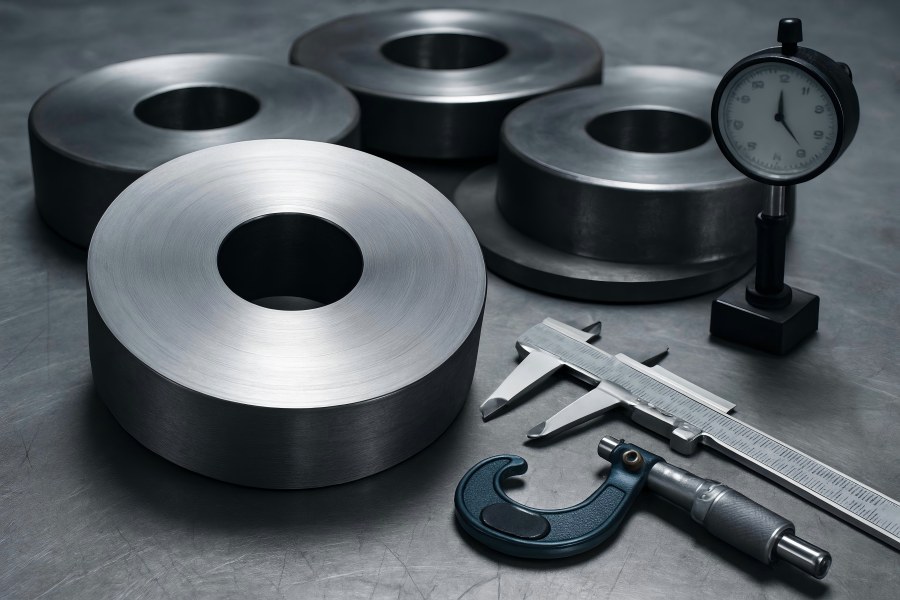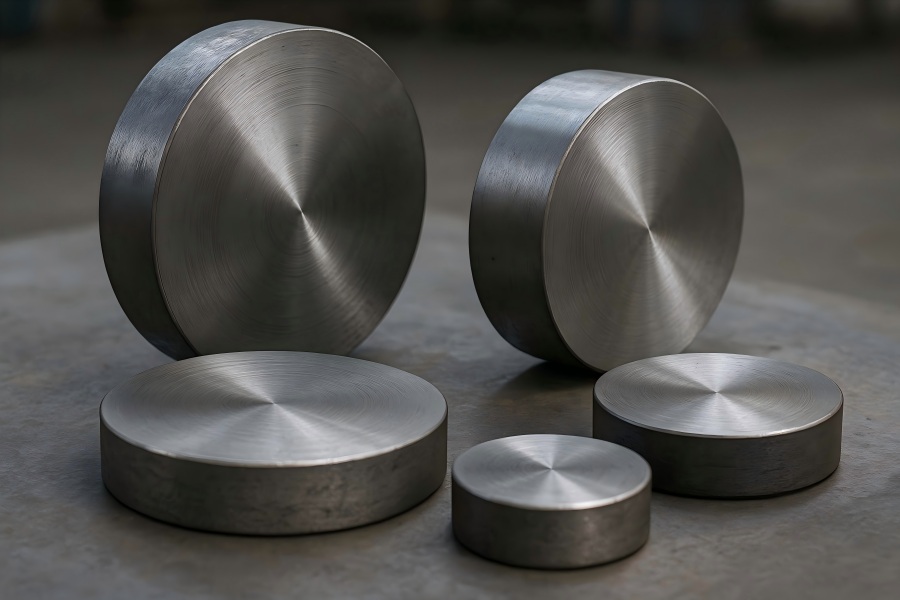Forged discs are critical in aerospace, automotive, power, marine, oil & gas, and heavy machinery, where they face high loads, heat, and corrosion. Selecting the appropriate supplier is a calculated step that will ensure long-term performance and security.
Technical Capabilities and Manufacturing Expertise
The first and most crucial factor is whether the supplier has the necessary technical knowledge, forging equipment, and metallurgical expertise to meet your specific disc requirements. Forged discs are used in applications where failure is not an option, such as turbine rotors, pressure vessels, brake rotors, or gear blanks. That’s why your supplier must demonstrate:
- Experience with custom forging grades (e.g., stainless steel, alloy steel, Inconel, titanium).
- Capabilities in open-die or closed-die forging based on your size, shape, and volume needs.
- Controlled forging temperatures and thermal treatment facilities.
- CNC machining and finishing precision to exact tolerances.
- Documentation of grain flow alignment for high-strength applications.
Table 1: Typical Forged Disc Sizes by Industry and Forging Method
| Industry | Disc Diameter Range (mm) | Thickness (mm) | Preferred Forging Method | Common Material Grades |
| Aerospace | 200 – 1000 | 30 – 150 | Open-Die | Inconel 718, Ti-6Al-4V |
| Oil & Gas | 250 – 1500 | 50 – 200 | Open-Die or Ring Rolling | AISI 4130, AISI 8630 |
| Automotive | 100 – 500 | 20 – 80 | Closed-Die | 42CrMo4, AISI 1045 |
| Wind Power | 500 – 2500 | 100 – 350 | Open-Die | S355J2G3, ASTM A694 F65 |
| Power Generation | 300 – 2000 | 80 – 300 | Open-Die or Closed-Die | ASTM A182 F22, A182 F91 |
When evaluating a supplier, ask:
- Can they forge discs of your size and complexity?
- Do they have in-house heat treatment, NDT, and machining?
- Are their engineers capable of advising on material and design improvements?
Material Quality and Traceability
High-quality forged discs begin with the right material. Your supplier must use certified ingots or billets from reputable mills and provide full traceability back to the source. This ensures metallurgical integrity, consistent grain flow, and proper mechanical properties after forging.
Key Evaluation Points:
- Do they use certified raw materials (e.g., ASTM, EN, JIS standards)?
- Is the material traceable from melt to final disc?
- Do they perform in-house or third-party chemical and mechanical testing?
- Are mill certificates (MTC) and heat numbers included with every shipment?
Table 2: Minimum Yield Strength Requirements for Common Forged Disc Materials
| Material Grade | Yield Strength (MPa) | Applications |
| AISI 1045 | 355 – 415 | Gear blanks, flywheels |
| AISI 4140 | 655 – 885 | Pressure discs, shafts |
| ASTM A182 F22 | 205 – 275 | Steam turbine discs, flanges |
| Inconel 718 | 965 – 1030 | Aerospace, high-temp applications |
| Titanium Grade 5 | 828 – 895 | Aerospace discs, racing engines |
Traceability and quality documentation (such as 3.1 or 3.2 certificates) are critical, especially for pressure-rated or safety-critical components.
Quality Control and Certifications
Forged discs cannot be compromised in terms of consistent product quality or conformity to international standards. Quality control systems must cover the entire production lifecycle: from raw material inspection to forging, machining, heat treatment, and final testing.
Certifications to Look For:
- Quality Management System (ISO 9001).
- Environmental Management (ISO 14001).
- Automotive Quality Management (IATF 16949, if applicable).
- Aerospace Quality Standard AS9100.
- PED, NORSOK, or API compliance (for oil & gas).
Common Quality Inspection Processes:
- CMM (Coordinate Measuring Machine) dimensional checks.
- Ultrasonic Testing (UT) to find interior defects.
- MPI (Magnetic Particle Inspection) for surface cracks.
- Hardness testing (Brinell, Rockwell).
- Charpy impact tests (for low-temperature service).
Table 3: Key Testing Protocols for Forged Discs by Industry
| Industry | Required Tests | Compliance Standards |
| Aerospace | UT, tensile, impact, grain flow analysis | AMS, AS9100, ASTM |
| Automotive | Dimensional, hardness, fatigue testing | IATF 16949, ISO |
| Power Generation | UT, hardness, metallography | ASTM A182, ASME Sect. VIII |
| Oil & Gas | MPI, UT, Charpy, tensile | API 6A, NACE MR0175 |
Never compromise on third-party inspection options, especially for high-value or safety-critical parts.
Production Capacity and Delivery Timelines
Even the most technically capable supplier won’t be a good fit if they can’t meet your volume or timeline requirements. Lead time delays can halt entire production lines, while inconsistent supply can cause severe bottlenecks in downstream manufacturing.
What to Evaluate:
- Can they handle your order volume—both prototype and mass production?
- What’s their average lead time for forged discs of your size and complexity?
- Do they have multiple forging lines to avoid bottlenecks?
- Can they scale production up or down without compromising quality?
Table 4: Average Lead Times for Forged Discs by Complexity Level
| Forging Complexity Level | Avg. Lead Time (Prototype) | Avg. Lead Time (Production) | Notes |
| Standard (≤ 300 mm) | 2–3 weeks | 4–6 weeks | Basic machining and heat treat |
| Medium (300–1000 mm) | 4–5 weeks | 6–8 weeks | Requires CNC + grain flow proof |
| High (>1000 mm) | 6–8 weeks | 10–14 weeks | Involves complex NDT + approvals |
| Aerospace-Critical | 8–12 weeks | 16–20 weeks | Requires AS9100 and PPAP |
Suppliers with flexible scheduling, advanced planning systems, and dual-source backup can help reduce risk and improve supply chain resilience.
Pricing Structure and Cost Transparency
Cost is a vital factor, but the lowest quote is rarely the best deal in the long run. Your supplier should offer not just competitive pricing but also full transparency on what the price includes, such as material grade, heat treatment, machining, testing, and packaging.
Key Pricing Variables:
- Material grade (Inconel vs. carbon steel can vary by 5–10x).
- Disc diameter and thickness.
- Required tolerances and surface finish.
- Testing and documentation requirements.
- Quantity (volume discounts available).
Table 5: Price Range for Forged Discs (Indicative)
| Material Grade | Size Range (mm) | Estimated Price (USD/kg) | Comments |
| AISI 1045 | 200–800 | $1.80 – $2.50 | Basic forging and rough machining |
| AISI 4140 | 250–1000 | $2.20 – $3.50 | Includes heat treatment |
| Stainless Steel 316 | 250–1000 | $4.00 – $5.80 | Used in chemical/marine sectors |
| Inconel 718 | 200–600 | $25.00 – $35.00 | Aerospace-grade pricing |
| Titanium Grade 5 | 150–500 | $30.00 – $45.00 | Premium aerospace/medical |
Ask for a detailed breakdown of:
- Material cost
- Forging cost
- Machining cost
- Testing/documentation cost
- Shipping and packaging
Avoid vague quotations that hide critical cost factors. Select vendors whose price policies meet your needs for volume and quality.
After-Sales Support and Long-Term Partnership
After delivery, a solid supplier connection continues. Ongoing technical support, issue resolution, and feedback integration are crucial—especially for OEMs and companies that rely on continuous design improvement or iterative prototyping.
Key Support Services to Look For:
- Post-delivery inspection assistance.
- Warranty coverage and return policy.
- Engineering consultations for future iterations.
- Documentation storage for long-term traceability.
- Responsive account management team.
You’ll want a supplier who:
- Communicates proactively
- Shares quality improvement initiatives
- Has experience working with global clients
- Offers on-site audits or factory visits if needed
Table 6: Supplier Evaluation Scorecard
| Evaluation Criteria | Weight (%) | Supplier A | Supplier B | Supplier C |
| Forging Capabilities | 20% | 18 | 14 | 16 |
| Material Quality & Traceability | 15% | 15 | 12 | 13 |
| Quality Control & Certifications | 20% | 19 | 17 | 18 |
| Delivery Lead Time & Flexibility | 15% | 13 | 14 | 12 |
| Cost Transparency & Pricing | 15% | 14 | 13 | 15 |
| After-Sales Support & Communication | 15% | 14 | 10 | 13 |
| Total | 100% | 93 | 80 | 87 |
This type of weighted evaluation allows objective comparisons across suppliers. Adjust weights based on your project needs.

